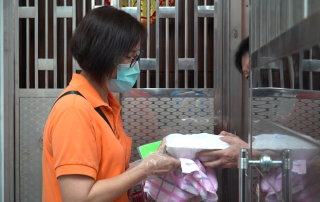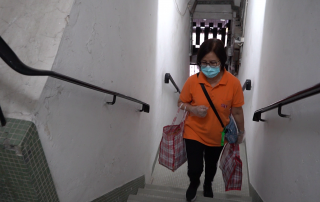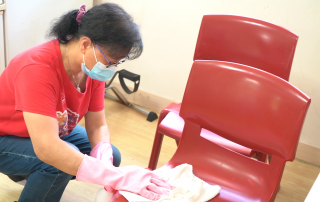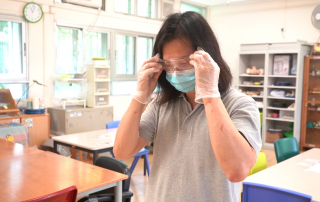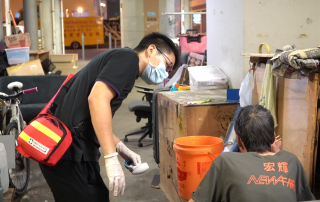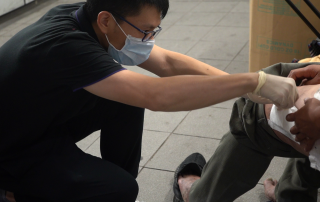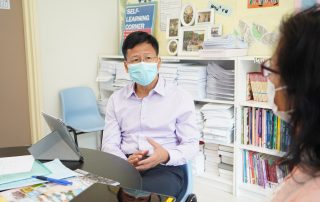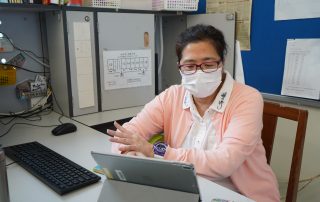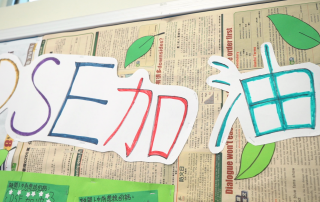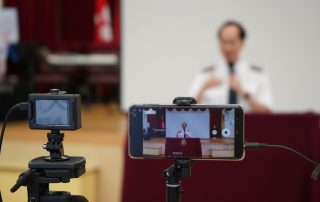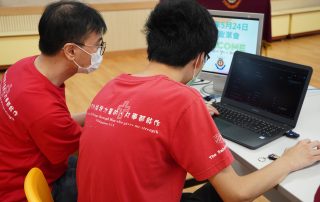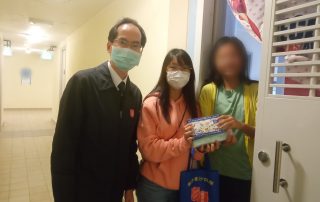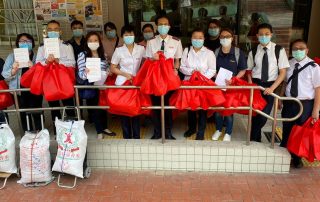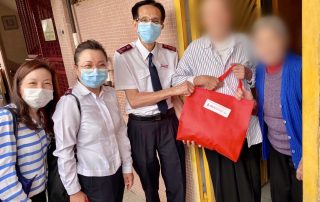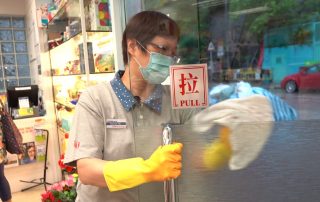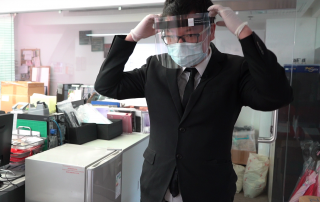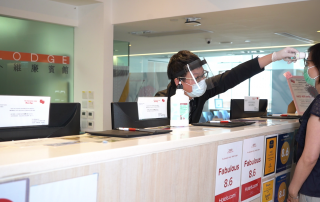In the last few months, with the pandemic spreading across the globe, it was easy for many of us to feel vulnerable. As our daily life is disrupted, the need of supports for the community is getting greater than ever. During this difficult time, our colleagues have strived to serve with dedication and perseverance and keep the daily operations running. We have gathered in this issue the stories and sharing from our colleagues of different service units during the pandemic.
Uninterrupted meal delivery
The Army Integrated Home Care Service Team has never ceased their services during the pandemic. Care worker Lai-sheung and her colleagues work every day to provide daily-life services for grassroots elders who are mobility-handicapped, suffering from dementia or with difficulties taking care of themselves. For some elders who are less able, care workers would even pay visit to them to help the household cleaning, help them taking shower and do some basic regular medical checks such as checking the blood pressure or blood sugar level.
Every day, Lai-sheung starts preparing meals for the elderly around 10 in the morning. Due to the pandemic, for hygienic reason the centre began to use disposable boxes for the food. In order to keep the food warm, each meal box is wrapped with a towel. This small gesture not only warms the food but also the hearts of the elderly.
Earlier this year, an elderly member of the service programme has been confirmed with COVID-19 infection. Lai-sheung and other team members who had brought food to this confirmed case have been identified as nonclose contacts. The whole team followed the instructions and underwent 28-day medical surveillance by measuring body temperature in each morning and e vening, closely monitoring their health conditions.
Lai-sheung admitted that she was worried when she first knew about the confirmed case, but she understood that they have done good protection.
‘We have always done protective measures when we did the door-to-door delivery. We wore surgical mask and gloves; and if we needed to go inside their flats we would also put on protection gowns and face screens.’
She was consoled to see that the hygienic consciousness has been heightened among the elderly members over the recent months and the elders she served in turn cared for her well-being. ‘They always remind me to drink more water, wash hands frequently and remember to close the toilet lid before flushing.’ The caring words from the elders warmed her heart most.
Residential home committing to ensure wellness of residents
Lai King Home, which provides residential care services for mentally handicapped trainees, not only operates as usual during this pandemic, but also provides around-the-clock support for trainees staying at the residential home. All the staff take the situation seriously and identify hygiene and sanitation as the most important task. Lai-ngor and Chi have put extra effort keeping the facility clean by sanitising all places and corners multiple times a day. It is stressful for them as carrying out such strenuous duties wearing a mask all day is exhausting and suffocating, and the strong and pungent smell of sanitation products makes it even harder.
Besides the hygiene control and caring duties for the trainees, two of them also offered consolation for trainees who were frustrated as they were unable to go home for vacation. ‘They have to stay here while their family cannot come to visit. They are deeply frustrated and agitated and they miss their family so much. We have to pay extra attention to their health and emotional changes,’ said Lai-ngor. To help the situation, the residential home acted promptly and arranged video calls for trainees so they could see their families through the screen and the scenes were unforgettable for Chi.
‘It brought trainees so much joy and energy when they could finally see their loved ones on screen. Their families are consoled too. Their smiles made me feel so hopeful,’ he recalled.
Healthcare support for the homeless
This pandemic has greatly impacted the lives of the homeless, especially the ones sleeping on streets. The outreaching team of The Salvation Army Integrated Service for Street Sleepers has never slowed down and has been working continuously to follow up this group and offer timely supports. Derek, a nurse of the outreaching team, goes out with medical care volunteers every week to follow up the medical conditions of the homeless on the streets. They also provide basic medical check-up and share anti-pandemic information. He pointed out that street sleepers might not be able to receive information as fast and as much as we did, and might not fully grasp the idea and the situation of this pandemic.
‘During this period we have spent particular effort on health and hygiene education, showing them how to wear masks correctly, when to use sanitisers, the COVID-19 symptoms and other aspects they should pay attention to.’
When the whole city was suffering the shortage of masks, naturally it was even more difficult for street sleepers to obtain anti-pandemic supplies. Thanks to the donations from the kind public, anti-pandemic supplies were then available for them to tide over this difficult time. In order to process and distribute the donated goods in a timely way, Derek and the social workers worked doubly hard. ‘It seemed that the homeless did not usually receive much attention in society. However, this time many companies and organisations actively approached us to offer help. The care they showed for the homeless was indeed a very nice surprise.’ The heartwarming supports from the community gave the team so much encouragement.
Together we support our students
Mr Edmond Hung, Principal of The Salvation Army William Booth Secondary School, remembered when the government first announced the suspension of schools, students might be excited about ‘the holiday’. However, as the pandemic escalated, class resumption was still not promising. ‘On the principle of “suspending classes without suspending learning”, both teachers and students were facing changes in the mode of learning and teaching. Difficulties with e-learning at home are inevitable,’ continued Mr Hung. ‘Some of our students had returned to their hometowns in the mainland during the school holidays. They have to deal with quarantine when they come back to Hong Kong. Some less privileged students need help from us as they are unable to get hold of enough anti-pandemic supplies. The DSE was also deferred due to the pandemic. It was really a very challenging time,’ Mr Hung said.
All these are crisis as well as opportunities for Mr Hung. He has to stay flexible and adaptive constantly in making decisions. Every day, he has to make timely contingency measures based on the latest epidemic situation and government policies. On top of giving live online lessons, the school also gathered supplies, such as computers, data cards and anti-pandemic supplies, for students in need. They also filmed some morale boosting videos for students taking the DSE. During these difficult days, the school had never been that busy, but also more united than ever, and both students and parents can certainly feel the efforts and thoughtfulness of the school through their arrangements.
For Miss Yan Pui-ching, teacher of Tourism and Hospitality DSE level, besides giving live online lessons every day, she also provided emotional support for students suffering from anxiety or negative emotions due to the epidemic, especially for this year’s DSE candidates. ‘When the DSE was deferred the first time, they might feel lucky that they could have more time to prepare, but when it was announced that there might be a chance to cancel the examination and use school assessment for evaluation instead, they started to falter. For if it was true, that meant they would miss the opportunity to prove their efforts, which might also affect their chances to choose what they wanted to study in the university.’ An academically gifted student who was rather introvertive once told Miss Yan via WhatsApp about her emotional distress. Miss Yan gave recognition to her conscientious attitude while also reminded her it was necessary to learn not to get too tensed up. When this student replied with ‘Thank you’, Miss Yan was greatly delighted.
Although she has been staying in touch with her students through the screen, Miss Yan felt being so apart from them.
‘The day when they returned to school to get their admission forms, I had the urge to hug them, but we had to keep the social distance. We could only catch up with each other and send regards among ourselves. In the end, everyone was reluctant to leave.’
Mr Hung also said that moments before the school suspension kept coming up to his mind from time to time. ‘I really want to have a football match or play table tennis with our teachers and students.’
When the government announced class resumption in phases, the school was already all set. Principal Hung, Miss Yan and all other school staff are looking forward to the school resumption and a smooth transition back into the regular, enjoyable days for all students and teachers.
Consistent pastoral care from the church
‘What can I do in the face of the pandemic?’ The answer from Major Alice Law, Corps Officer of William Booth Corps is to reach out to the community. At the beginning of the pandemic, William Booth Corps (Church) already received from brothers and sisters and the public supplies including masks, rice, oil, and coupons of supermarkets and restaurants. The church immediately organised the supplies and worked with other Salvation Army units in the region (including Senior Citizens Talent Advancement Project Tung Tau Centre, Chuk Yuen Integrated Service Centre and William Booth Secondary School) to distribute them to the elders and families in need. ‘Some elders had been home-bounded since the Chinese New Year as they had no mask. We delivered them the masks and taught them how to wear them correctly.’
Shatin Corps sent supplies to church members from time to time, and they also reached out to those in need in the community through the help of Lung Hang Children and Youth Centre of The Salvation Army. ‘Some grassroots groups were worried as they were unable to get hold of masks. We are very grateful that a brother who works in the medical supplies business donated masks to those in need,’ said Major Raymond Cho, Corps Officer of Shatin Corps.
To comply with the anti-pandemic measures, actual church meetings were cancelled. Pastors and brothers and sisters recorded the Sunday worship on video in advance for members to keep the worship routine. But what about other pastoring and caring work that require more interaction? Over 60’s Club, Couple Fellowship, Junior Soldiers and Children Sunday School of the Corps provide different activities and games through internet, e.g. Online Bible quiz hosted by Junior Soldiers’ Leaders, and the video demo of making Mother’s Day card for children to follow and make their own cards for their mothers. As the pandemic began to ease, Major Law paid visits to fellow sisters in bad health and teachers in need. ‘Pastoral care should not stop due to the pandemic. It is exactly a difficult time like this that we need to stay connected.’
According to Major Cho, the Corps kept learning the feedbacks from church members about the online worship and stayed communicated with them so that the Corps can fulfil their needs as much as possible. Some church members might feel down as they were unable to join the Corps meetings for many weeks, so Shatin Corps has kept its doors open except Mondays so that any individual church members could come back whenever they wanted to talk with the pastors and to pray together and get some mutual encouragement. As the pandemic has eased, the pastors would have meal from time to time with church members individually to give them emotional comfort.
‘Actually I have not worked from home too much since the pandemic. We need to proactively support our church members. If the church is not here to do pastoral care duties during this unusual time, member s may think the church does not care and lose the sense of belonging.’
Family store taking steps forward for customers and colleagues
Mandy Ho, The Salvation Army Yaumatei Family Store Manager, can feel the distinctive changes in daily business during the pandemic. ‘At the beginning, our customer flow dropped drastically. For the safety of our staff, division of labour is practised so we could keep less staff working at the same time while maintaining the daily shop operation. The shop is sanitised regularly and we measure temperature for every customer coming in, at the same time reminded those without mask to wear one when they entered the shop. As the pandemic has eased recently, the shop became crowded again and now we are busy just as before.’
Manager Ho admitted she was concerned at the beginning of the pandemic. Thankfully, the anti-pandemic gears provided by the Army and the team spirit of the colleagues have allowed the team to get through the tough time.
‘I keep myself balanced and try not to have my emotions or health affected by this pandemic situation. I also look out for my colleagues and remind them to take rest if they are unwell. Our customers are wonderful too. They would remind us to measure temperature for them even sometimes we may be too busy to notice.’
Hostel staff helping out quarantine guests
The number of visitors has dropped significantly since the pandemic. During this time, Booth Lodge mainly accommodated local guests and Hongkongers who have just returned to Hong Kong and needed quarantine. Alex, who works at the front desk and is responsible for tasks such as reservation and checkin/check-out, also delivered food and supplies to the doors of guests in quarantine, and took their laundry to clean. Since those guests cannot leave their rooms to have breakfast provided at the lobby, Alex has delivered it to their rooms.
Every time Alex set foot on the floor where the quarantine guests stayed, he needed to be in fullgear: mask, face shield, gloves and shoe covers. He would put the food, supplies and clean laundry at the designated spot on the corridor, and then inform the guests to take them themselves. His gears, all except the face shield, have to be disposed of immediately after use.
‘At the beginning it was a bit disquieting to handle the used gear items, but with sufficient training, we soon got familiar with the procedures and were no longer worried.’
In the past few months, the most unforgettable incident for Alex was that he had to arrange delivery of a saliva sample for COVID-19 testing to a clinic for a guest, whose family were unavailable. The guest sought the help of the front desk and Alex managed to find a service provider that can do the task. The guest greatly appreciated the help and gave great reviews for Booth Lodge on the website.
Deep gratitude for the selfless efforts of every colleague
This is a difficult time which has posed great challenges for every colleague, who has to bear great pressure and increased workloads. We are so grateful for their commitment, positive attitude, working ethics and continuous services and supports. We hope this disease can end soon so that everyone can be relieved and has the daily life resumed.



